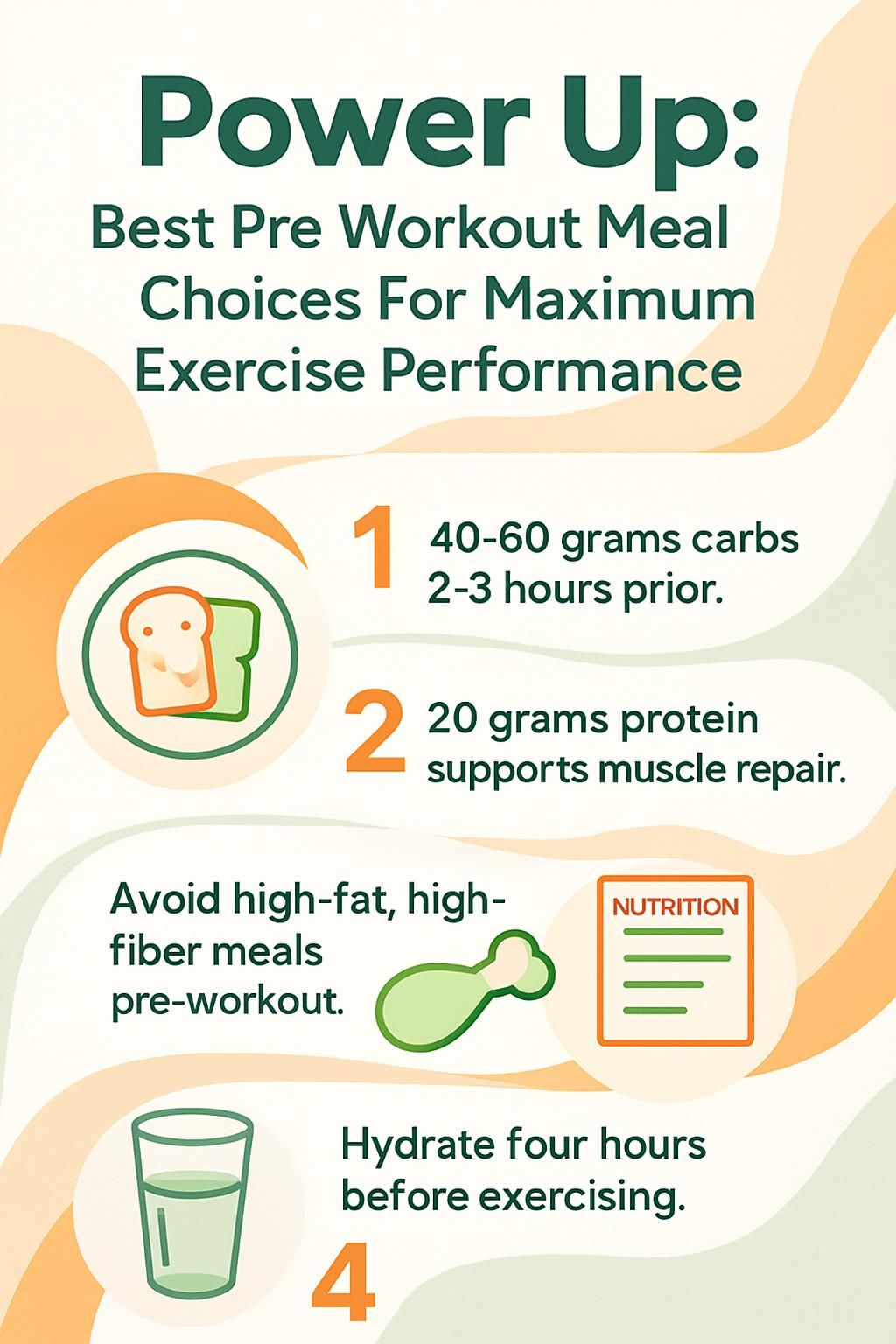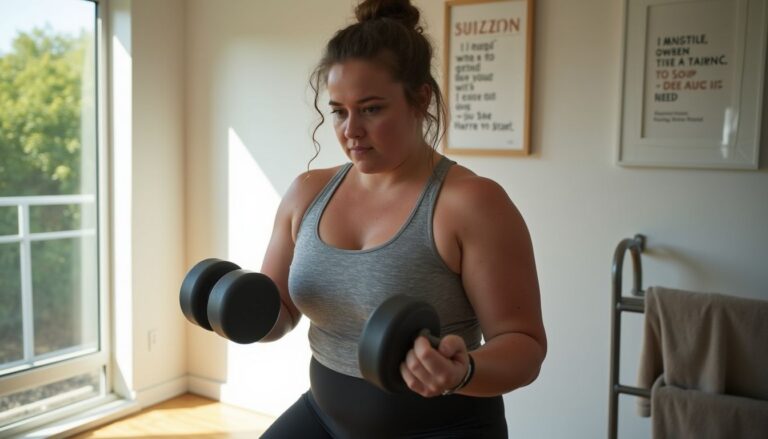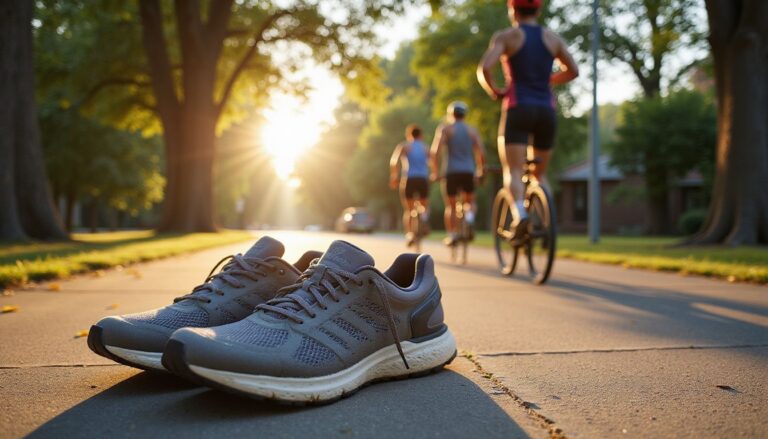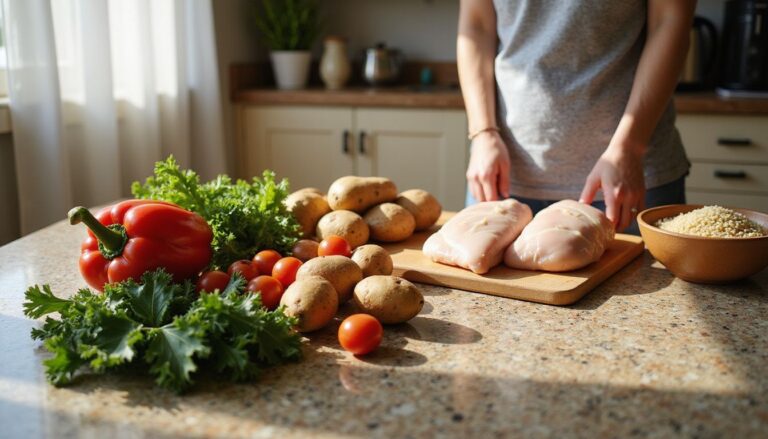Power Up: Best Pre Workout Meal Choices For Maximum Exercise Performance
Our Nutrition Assistant AI Suite will transform your body. You will lose fat, get toned, and build muscle. Gain confidence and optimal health.
Feeling tired halfway through a workout can be discouraging, even if you eat healthy most days. I have felt that slump too, and it can ruin focus and form.
A smart pre-workout meal sets your energy, mood, and strength for the entire session. Research-backed choices help you start strong and finish strong.
In this guide, I share simple pre-workout nutrition steps, clear timing rules, and easy meal ideas. If you want steady energy and better performance, keep reading for practical tips you can use today.
Key Takeaways
- A balanced pre-workout meal about 2 to 3 hours before exercise works best. Aim for 40 to 60 grams of carbohydrates, around 20 grams of protein, and a small amount of healthy fat (International Society of Sports Nutrition, Academy of Nutrition and Dietetics).
- Carb-rich foods like oatmeal or a banana top off muscle glycogen, your stored energy. Higher glycogen supports longer and harder workouts (American College of Sports Medicine).
- About 0.3 grams of protein per kilogram of body weight before training supports muscle repair and reduces muscle breakdown (ISSN).
- High-fat or high-fiber meals right before activity can upset your stomach. If you eat within one hour, choose easy to digest snacks.
- Hydrate well, starting at least four hours before exercise. Use electrolyte drinks during sessions longer than one hour to maintain performance and cut fatigue (ACSM).

The Role of Nutrition Before Workouts

Eating the right foods before exercise gives your body fuel and supports muscle function. Knowing what to eat before a workout helps you get more from every minute you train.
How Does Nutrition Energize Your Body for Exercise?
Carbohydrates are my main energy source during exercise. Muscles use glucose from carbs to make fuel, especially for high-intensity or short efforts.
Glycogen is stored carbohydrate in the liver and muscles. It provides quick energy when I push hard. A banana or oatmeal 60 minutes before training often gives me a noticeable lift.
Healthy fats supply longer lasting energy for longer efforts like cycling or long runs. I do best when I combine carbs with a small amount of fat. It helps prevent early fatigue and keeps blood sugar steady during tough sessions.
How Can Nutrition Boost Exercise Performance and Endurance?
If I eat a carb-rich pre-workout meal, I start with higher glycogen stores. The ISSN notes that low glycogen during long workouts reduces power and intensity. Carbs before aerobic training or resistance sessions longer than 60 minutes can increase time to fatigue.
Protein from Greek yogurt or chicken before a session supports repair and limits muscle breakdown. A 2020 review suggests eating within three hours of activity for steady energy through intense work. Certain supplements like creatine, caffeine, branched-chain amino acids, and beta-alanine may also support hard training.
Pre-exercise carbohydrate intake improves endurance capacity by maintaining higher rates of carbohydrate oxidation, states the American College of Sports Medicine.
How Does Nutrition Support Muscle Repair and Recovery?
Protein before workouts can increase muscle protein synthesis, the process of building and repairing muscle. The ISSN reports that pre-workout protein can improve strength and support lean mass over time.
Aiming for 20 to 40 grams of high-quality protein per meal helps repair damage from training and reduces breakdown. Pairing carbs with protein before activity also tops off energy and cuts post-exercise fatigue. I recover faster when I include both nutrients around my lifting days.
Essential Elements of Pre-Workout Meals
The best pre-workout meals include carbohydrates, protein, and a small amount of fat. This mix fuels effort and supports recovery.
Why Are Carbohydrates Important for Pre-Workout Energy?
Carbohydrates are my primary fuel for training. Glycogen stored in muscle and liver drives intense work and endurance efforts.
A meal with enough carbs before strength training helps build up glycogen reserves. Research shows higher carb intake maximizes glycogen use and improves energy output during hard sessions. A bowl of oatmeal or a banana with nut butter gives quick, useful fuel.
How Does Protein Help with Muscle Maintenance?
Protein protects muscle during high-intensity exercise. Eating protein before training increases muscle protein synthesis, so the body repairs and builds more effectively. The ISSN finds that pre-workout protein supports muscle mass and performance.
About 0.3 grams per kilogram of body weight before exercise supports strength and recovery. I notice better endurance on long days when I include strained yogurt or eggs, both rich in amino acids, the building blocks of protein.
What Role Do Fats Play in Providing Long-Lasting Energy?
Fat is a steady fuel source during longer, moderate efforts. Healthy fats from nuts, seeds, and avocados can help me feel satisfied and powered for sessions over an hour.
Some small studies suggest that higher fat intake before endurance training may spare glycogen, but eating large high-fat meals too close to exercise can cause bloating. I keep portions modest and allow time to digest.
The next section explains how timing your pre-workout meal affects comfort and performance.
Optimal Timing for Pre-Workout Nutrition
Timing acts like a green light for energy. The right window can turn a good meal into a great one.
When Should You Eat a Full Meal Before Exercise?
I get the best results when I eat a complete meal 2 to 3 hours before exercise. Research from the Academy of Nutrition and Dietetics supports this timing for energy and recovery.
My go-to meals include whole grain bread with sliced chicken and salad, or half a sweet potato with salmon and vegetables. This balance gives roughly 40 to 60 grams of carbs, around 20 grams of protein, and moderate fat. It keeps me satisfied without feeling heavy.
Larger meals need time to digest. Eating them at least two hours ahead helps prevent stomach issues, especially for sessions longer than an hour. Planning the meal window keeps my training smooth from start to finish.
What Are Good Light Snack Options 30-60 Minutes Before Exercise?
When I am short on time, I choose light snacks that digest quickly and focus on carbohydrates with a little protein.
- A banana with peanut butter for quick carbs, potassium, and a touch of healthy fat.
- Greek yogurt with berries for protein and simple sugars that absorb fast.
- A protein smoothie with water or milk, protein powder, banana, and berries for easy sipping and hydration.
- An energy bar with at least 20 grams of carbs and under 5 grams of fat for quick fuel.
- Apple slices with nut butter for vitamins, water content, and staying power.
- Rice cakes with cottage cheese for simple carbs plus gentle protein.
- A small bowl of oatmeal with sliced almonds and a little honey for steady release.
- Drink water, and use an electrolyte drink if you expect heavy sweating.
Top Choices for Pre-Workout Meals
Picking a nutrient-rich meal or snack well before you train can raise energy, focus, and power.
What Makes Oatmeal, Berries, and Nuts a Good Pre-Workout Meal?
Oatmeal, berries, and nuts deliver complex carbs, fiber, healthy fats, and protein. Oatmeal offers slow-release energy that stabilizes blood sugar during long sessions.
Berries add natural sugars and antioxidants that support circulation. Nuts such as almonds add plant-based protein and healthy fat, which curb hunger without weighing me down. I often eat oatmeal with banana, berries, almonds, or a scoop of protein powder about two hours before training.
Why Is Banana with Nut Butter a Great Pre-Workout Choice?
Banana with almond or peanut butter is a simple, effective option. The banana provides quick-digesting carbs to support glycogen, usually within 45 to 60 minutes.
Nut butter supplies healthy fats and a bit of protein for longer lasting energy. One medium banana has about 27 grams of carbs. Two tablespoons of almond butter add roughly 7 grams of protein and 18 grams of fat. This balance prevents mid-workout dips and keeps me steady.
How Does Greek Yogurt, Granola, and Fruit Fuel Your Workout?
Greek yogurt with fruit and granola is a light, protein-rich meal I can eat within an hour of exercise. One cup of Greek yogurt often provides 15 to 20 grams of protein and supports muscle maintenance.
Granola adds carbohydrates to top up glycogen. Berries bring quick sugars and antioxidants, plus vitamin C and fiber, without slowing me down. This mix keeps my energy even during longer sets.
Why Choose Chicken, Brown Rice, and Veggies Before Exercising?
Chicken, brown rice, and vegetables offer lean protein, complex carbs, and key micronutrients. Brown rice digests slowly and provides steady energy. Chicken delivers essential amino acids for repair.
Vegetables add fiber and vitamins like vitamin C and potassium with few calories. I sometimes swap in lean ground beef with brown rice and roasted vegetables for variety. Meals like this support endurance and help manage blood sugar before training.
What Are the Benefits of Smoothies with Protein, Fruit, and Milk?
On days I want something light, smoothies with protein, fruit, and milk work well. A blend made with milk or water, protein powder, banana, and berries gives fast carbs and 20 grams of protein without feeling heavy.
Milk adds calcium and vitamin D for muscle contraction[1]. A 2022 paper suggests that about 20 grams of protein plus simple carbs before and after hard training can support recovery (Dose et al., 2022). I also stay better hydrated with this mix than with juice alone.
[1] Dose J., et al. “Whey Protein Supplementation Improves…,” Nutrients Journal (2022).
Ideal Pre-Workout Snacks
I pick snacks that pair carbs and protein for steady energy. Here are options that fit most plans and can be adjusted to your taste.
How Does Toast with Avocado on Whole Grain Support Workouts?
Whole grain toast gives complex carbohydrates that release energy slowly. That helps me avoid an energy crash during exercise.
Avocado adds healthy fats for longer sessions and supports fullness. Eating this within two hours of activity fits guidance that favors carb-rich meals with moderate fat one to two hours before training. It also supports blood sugar control.
Why Are Apple Slices with Peanut Butter a Good Snack Before Exercise?
Apples provide quick sugars for glycogen, and peanut butter adds healthy fats for staying power. This mix works well when I need a small snack, not a large meal.
One medium apple has about 25 grams of carbohydrates. Two tablespoons of peanut butter add around 8 grams of fat and some protein. Eating this 30 to 60 minutes pre-workout gives steady fuel.
What Nutritional Bars Are Best for Pre-Workout Energy?
Protein bars are convenient when I am on the go. I look for 20 to 30 grams of carbohydrates, at least 7 grams of protein, and low saturated fat. That balance supports energy and muscle maintenance.
I check labels to avoid very high sugar alcohols or fiber that can upset my stomach during intense work. I often pick Clif Bars, RXBARs, or Quest Protein Bars because they deliver fast carbs and enough protein.
Nuts and dried fruits are another easy, portable choice if a bar does not fit your taste.
How Can Nuts and Dried Fruits Mix Help Your Workout?
Nuts like almonds supply healthy fats and a little protein for lasting energy. Dried fruits such as raisins and apricots give fast carbs that fuel muscles quickly.
One ounce of almonds has about 6 grams of protein and over 3 grams of fiber, while a quarter cup of dried apricots offers roughly 22 grams of carbs^1^. I keep a small bag in my gym bag for busy days.
The next section covers why rice cakes with cottage cheese also work well right before activity.
^1 USDA FoodData Central
Why Choose Rice Cakes Topped with Cottage Cheese as a Snack?
Rice cakes give simple, easy to digest carbohydrates. Topping them with cottage cheese adds about 14 grams of protein per half cup, which supports muscle without feeling heavy.
One plain rice cake contains around 7 grams of carbs. Two tablespoons of cottage cheese add about 80 calories with minimal fat. I like this 30 to 60 minutes before a workout. It fits current sports nutrition guidance for light pre-workout snacks.
Goal-Oriented Pre-Workout Meal Planning
I plan my pre-workout meals around my goals, like gaining muscle, managing weight, or building endurance. The right mix makes training feel smoother.
What Are High-Protein Options for Muscle Gain?
Higher protein before training can support muscle building and recovery. The ISSN notes that pre-workout protein helps performance and lean mass over time.
- Make an omelet with lean ground beef for around 30 grams of protein.
- Choose Greek yogurt with nuts or berries for 20 plus grams of complete protein and some carbs.
- Eat chicken breast with brown rice for about 25 grams of protein and steady fuel.
- Snack on cottage cheese with whole grain toast for casein-rich protein and slow carbs.
- Blend whey protein powder into a fruit smoothie for up to 25 grams of fast protein.
- Cook an egg omelet with vegetables for a balanced, amino acid rich meal.
- Pair hummus with boiled eggs or whole grain crackers to combine plant and animal proteins.
Next, see low-calorie options that help if weight control is your focus.
Which Low-Calorie Snacks Support Weight Management?
When I want to manage weight, I use light snacks that still support energy for exercise.
- One banana for quick carbs in a compact portion.
- Apple slices with one tablespoon of peanut butter for filling fiber and healthy fats under 180 calories.
- Two small slices of whole grain toast, about 140 calories, for slow-digesting carbs.
- One rice cake with two tablespoons of cottage cheese for under 100 calories.
- Oranges or clementines for vitamin C and hydration at 60 to 80 calories each.
- Four ounces of Greek yogurt for about 60 to 70 calories and useful protein.
- A quarter cup of dried fruit with unsalted nuts, kept to portion, for under 120 calories.
- Light nutrition bars in the 90 to 130 calorie range when you need a quick option.
These choices keep me satisfied without feeling too full before training.
What Carb-Intensive Choices Are Best for Endurance Training?
Endurance training needs more carbohydrates to fill glycogen stores. These meals help me last longer during a hard day.
- Oatmeal mixed with protein powder, banana, and almonds for both quick and steady fuel.
- Brown rice with grilled chicken for slow carbs and protein that release energy evenly.
- Whole wheat pasta with tomato sauce to power two-hour rides or long classes.
- Roasted sweet potatoes with olive oil for a mix of fast and lasting carbs.
- A bagel with natural peanut butter to load glycogen quickly before team sports.
- Energy bars based on oats and dried fruit for a portable carb source without heavy fat.
- Low-fat Greek yogurt with granola for quick sugars plus enough bulk to prevent hunger.
- Fruit smoothies made with milk, bananas, berries, and whey protein for fuel and hydration.
Carb-heavy meals like these work best 60 to 120 minutes before endurance training, based on recent nutrition research on muscle performance (Smith et al., 2024).
What to Avoid Before Workouts
The wrong pre-workout foods can sap energy or upset your stomach. Careful choices help you train harder and feel better.
Why Should You Avoid Greasy, High-Fat Foods Before Exercise?
Greasy, high-fat foods digest slowly and can sit in the stomach during exercise. That can cause bloating, nausea, or cramps.
These meals also shift blood flow toward digestion and away from working muscles. I once ate a burger with fries an hour before cycling, and my energy crashed as nausea increased. Save rich meals for non-training times.
How Can Limiting High-Fiber Foods Prevent Discomfort During Workouts?
High-fiber foods right before training can cause gas, cramping, or a heavy feeling. Fiber slows digestion. I felt this after a large bowl of high-fiber cereal an hour before a run.
Choose smaller portions of complex carbs several hours ahead. Foods like potatoes or brown rice are great earlier in the day, but eat lighter right before your session.
Why Avoid Sugary Snacks to Prevent Energy Crashes?
Sugary snacks create a fast spike, then a sharp drop in blood sugar. That crash can leave me tired and unfocused in the middle of a workout.
The American Journal of Clinical Nutrition has shown that high-glycemic foods can cause rapid rises and steep falls in glucose within an hour. I feel steadier with oatmeal or fruit plus protein instead of candy or pastries.
Importance of Hydration and Suitable Drinks
Hydration affects energy and muscle function. The right fluids replace what you lose in sweat.
Why Is Staying Hydrated Important for Effective Workouts?
Water supports strength, speed, and stamina. Even mild dehydration can lower performance. ACSM notes that losing as little as 2 percent of body weight in sweat can make workouts feel harder.
I start hydrating at least four hours before exercise and drink to comfort. Good hydration also helps control temperature and reduces the risk of cramps. Proper fluids make pre-workout meals easier to digest and use.
When Should You Use Electrolyte-Rich Drinks During Training?
Long or hot sessions increase sweat loss and sodium loss. I use electrolyte drinks during workouts that last more than 60 minutes or when I sweat heavily. Sodium aids fluid balance and helps prevent cramps.
For sessions under an hour, water is usually enough. Before long lifts or endurance events, I use beverages or salty snacks to support hydration. Choose what fits your stomach and conditions.
Sample Pre-Workout Recipes
These simple recipes use easy ingredients and take little time. Each supports steady energy and muscle function.
How to Make an Almond Butter and Banana Smoothie?
Almond butter and banana smoothies blend protein, fast carbs, and healthy fats for balanced fuel.
- Gather one ripe banana, one tablespoon almond butter, one scoop protein powder, 1/2 cup mixed berries, and one cup water or milk.
- Slice the banana for easier blending and even sweetness.
- Add banana and almond butter to the blender.
- Add protein powder to support muscle repair. Plain or vanilla works well.
- Add mixed berries for antioxidants and light sweetness.
- Pour in water or low-fat milk for hydration and texture.
- Blend on high until smooth.
- Adjust with more liquid if you prefer a thinner drink.
- Drink 30 to 60 minutes before exercise for balanced pre-workout nutrition.
This quick smoothie fits busy mornings before the gym or sports practice.
What Is a Protein-Enhanced Oatmeal Bowl Recipe?
This bowl combines complex carbs, protein, and healthy fats. It keeps me satisfied without slowing me down.
- Cook 1/2 cup old-fashioned oats in water or low-fat milk.
- Stir in 1 scoop protein powder while the oats are hot.
- Add half a sliced banana for sweetness and potassium.
- Top with 1 tablespoon chopped almonds for healthy fat and crunch.
- Add a handful of berries for antioxidants and vitamins.
- Eat 60 to 90 minutes before training for best results.
Next, see a balanced chicken and sweet potato bowl that fuels longer sessions.
How to Prepare a Nutritious Chicken and Sweet Potato Bowl?
This bowl pairs lean protein with complex carbs for steady energy and strong performance.
- Grill a palm-sized chicken breast with a little olive oil and simple seasoning.
- Bake half a medium sweet potato at 400°F for about 25 minutes. Keep the skin for extra fiber.
- Steam or grill bell peppers and broccoli for vitamins and antioxidants.
- Assemble the bowl with sliced chicken, the sweet potato base, and the vegetables.
- Add parsley or lemon juice for bright flavor without extra sugar.
- Eat 2 to 3 hours before training. This timing supports strength and delays fatigue.
- This combo keeps my energy steady through intense gym sessions without stomach issues.
Next is a quick Greek yogurt option that also works well before or after training.
What Is a Quick Energy Greek Yogurt with Berries Recipe?
Greek yogurt with fruit gives protein and fast carbs in a small, easy snack.
- Start with 6 ounces of plain Greek yogurt, about 15 grams of protein.
- Add 1/2 cup mixed berries for quick sugars and antioxidants.
- Top with 1 tablespoon chia seeds or chopped nuts if you want extra texture and healthy fats.
- Stir in 1 teaspoon honey for a touch of rapid energy.
- Serve right away, or chill for up to 20 minutes for a cooler snack.
- Use low-fat yogurt if fat close to training bothers your stomach.
- Adjust fruit portion for longer cardio sessions while keeping protein near 15 grams.
This simple bowl stays light but delivers useful fuel for most workouts.
Avoiding Common Pre-Workout Nutrition Errors
Small mistakes with timing or portions can limit progress. A short plan helps me avoid these traps.
How to Time Meals Correctly Relative to Workouts?
I eat my largest pre-workout meal 2 to 3 hours before exercise. It includes carbs, protein, and a little fat. If I need a closer boost, I eat a smaller snack with mostly carbs and some protein 60 to 90 minutes before.
For example, oatmeal with nuts works two hours out. Greek yogurt with berries works when I am short on time. This timing aids digestion and reduces discomfort during training.
What Is the Best Way to Balance Meal Proportions Before Exercising?
After setting the timing, I balance portions. I aim for half my plate from carbohydrates, one fourth from protein, and one fourth from healthy fats.
As an example, 1 cup brown rice, 3 ounces grilled chicken, and half an avocado provide steady energy. On lifting days, I raise protein a bit. On cardio days, I add more carbs like fruit or oats. This flexible plan supports comfort and performance.
Matching Pre-Workout Meals with Exercise Types
I match my pre-workout meal to the type of exercise for better results.
What Protein-Focused Meals Are Ideal for Strength Training?
An egg omelet with whole grain toast, avocado, and fruit provides strong protein support. ACSM notes that 20 to 30 grams of high-quality protein can aid muscle growth before lifting.
Greek yogurt with berries and a little granola gives 15 to 20 grams of protein with steady carbs. Chicken breast with brown rice and mixed veggies is another favorite. I also use whey smoothies with milk, banana, and peanut butter for about 30 grams of fast protein.
Which Carbohydrate-Prioritized Meals Suit Cardio Sessions?
For cardio, I focus on carbohydrates for quick and steady fuel. An almond butter and fruit preserve sandwich on whole grain bread works well before runs. It provides fast carbs and a touch of fat without feeling heavy.
Oatmeal with banana slices or brown rice with roasted vegetables also digest easily and maintain blood sugar during training. These simple meals help me finish with energy to spare.
Conclusion
The right pre-workout meal can lift performance and support faster recovery. Carbs provide fast fuel, protein supports muscle repair, and healthy fats extend energy during longer sessions. Plan your meal timing and portions, then test a few options to see what your body likes.
If you have a medical condition, talk with a registered dietitian or your healthcare provider before changing your routine. With a smart plan and steady hydration, you can fuel your body, train with confidence, and feel strong from warm-up to the last rep.
FAQs
1. What are the best pre workout meal choices for maximum exercise performance?
The best pre workout meals combine complex carbohydrates, lean proteins, and small amounts of healthy fats. Oatmeal with low-fat milk and berries, whole grain toast with eggs, or brown rice with grilled chicken provide steady energy release and support muscle function. Studies show that eating these foods 60 to 90 minutes before exercise can improve endurance and strength (Smith et al., 2019).
2. How much time should pass between eating a pre workout meal and starting exercise?
Eating your pre workout meal about one to two hours before physical activity allows for proper digestion and nutrient absorption. This timing helps prevent stomach discomfort while ensuring glucose is available as fuel during your session.
3. Can skipping a pre workout meal affect my performance?
Skipping a balanced meal before training may lead to lower blood sugar levels; this often results in fatigue or reduced focus during workouts (Jones & Lee, 2020). Personal experience supports this finding; on days when I missed breakfast before running, my stamina dropped quickly compared to days I ate oatmeal beforehand.
4. Are there specific nutrients that boost exercise output in a pre workout meal?
Yes; research highlights the importance of carbohydrates for quick energy, protein for muscle repair, and fluids for hydration (American College of Sports Medicine). A summary table below shows key nutrients:
Nutrient | Function
—————–|————————————–
Carbohydrates| Provide fast energy
Protein| Support muscle recovery
Healthy Fats | Offer sustained fuel
Fluids | Prevent dehydration
Choosing meals rich in these elements prepares the body for peak physical effort while reducing risk of early fatigue or injury.
Summary: Selecting balanced meals containing carbs, protein, healthy fats, and fluids about an hour prior to activity optimizes both short-term performance and long-term health outcomes according to current evidence-based guidelines.







